 Janus Head Janus Head
11.1&2

Travels Inside the Archive
Robert Gibbons
Edge of Maine Editions

Beyond Time
New & Selected Work
1977 - 2007
Robert Gibbons
 The Age of Briggs & Stratton The Age of Briggs & Stratton
Peter Culley
|
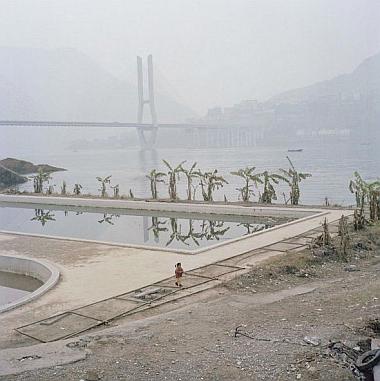
Liu Ke
via Mrs. Deane
_______________________
ROCKPILE on the road
Poems by Michael Rothenberg & David Meltzer
photos by Terri Carrión
& an introduction by Larry Sawyer
a Special Feature in Otoliths 17
ANGELS SLEEP IN PEACE!
Michael Rothenberg
Angels sleep in peace!
Devils stay past midnight
listen to Paganini
Pretenders, King Of America, Heartless Liars
Have you heard them playing 8-ball while reading Ziggy’s Dream?
Did it matter when the Army closed
imagination’s terrifying halls to Strategists of Art?
No, it doesn’t make sense to matter
No explanation needed for transfer of funds
from one pocket to another
For those Charlie Chaplins entering data,
boiling nouvelle shoe leather soup
Supping on Valentine’s Desires and Therapeutic seasonings
It makes sense
Angels sleep in peace!
Devils stay past insomnia
Possum scud across the roof
Listening to accusations of the trite and trivial
from Fashion Fascists
Reveling in accusations of the ideal & naïve
soaked in gross dependencies & mother
Have you heard them in their drunken dance
on granite floors,
In the rhythm of Sisyphus?
...(more)
_______________________
"Imagine if the Tea Party Was Black"
Tim Wise
via Follow Me Here
_______________________
from
Bold Marauder
Richard Fariña
March 8, 1937 - April 30, 1966
It’s hi, ho, hey,
I am the bold marauder.
And hi, ho, hey,
I am the white destroyer.
For I will bring you silver and gold
And I will bring you treasure
And I will bring a widowing flag
And I will be your lover
And I will show you grotto and cave
And sacrificial altar
And I will show you blood on the stone
And I will be your mentor
(...)
For I will take you out by the hand
And lead you to the hunter
And I will show you thunder and steel
And I will be your teacher
And we will dress in helmet and sword
And dip our tongues in slaughter
And we will sing a warrior’s song
And lift the praise of murder
And Christ will be our darling
And fear will be our name
Subversive Aspects of Popular Songs
Kenneth Rexroth 1969
_______________________

bellmouth spillway
Ladybower reservoir
Derbyshire
Serigrapher
An edge over which it is impossible to look
BLDGBLOG"... a geometrical oddity: an edge over which it is impossible to look. Because you can see the endless walls of the abyss both below you and facing you, nothing is hidden except what is down the hole. Standing on the rim, you are very close to a mystery: a space receiving the light of the sun into which we cannot see."
Andrew Crompton, "Three Doors to Other Worlds" [pdf]
_______________________
The Force That Drives the Flower
Annie Dillard
b. April 30, 1945
The Atlantic Monthly | November 1973
I don't know what it is about fecundity that so appalls. I suppose it is the teeming evidence that birth and growth, which we value, are ubiquitous and blind, that life itself is so astonishingly cheap, that nature is as careless as it is bountiful, and that with extravagance goes a crushing waste that will one day include our own cheap lives. Every glistening egg is a memento mori.
(....)Any three-year-old can see how unsatisfactory and clumsy is this whole business of reproducing and dying by the billions. We have not yet encountered any god who is as merciful as a man who flicks a beetle over on its feet. There is not a people in the world that behaves as badly as praying mantises. But wait, you say, there is no right and wrong in nature; right and wrong is a human concept. Precisely: we are moral creatures, then, in an amoral world. The universe that suckled us is a monster that does not care if we live or die—does not care if it itself grinds to a halt. It is fixed and blind, a robot programmed to kill. We are free and seeing; we can only try to outwit it at every turn to save our skins....(more)
_______________________

Creative Disorder
Grzegorz Wróblewski
The New Post-literate
A Gallery Of Asemic Writing
curated by Michael Jacobson
_______________________
Remaking Social Practices
Felix Guattari
Translated by Sophie Thomas
appeared under the title "Pour une refondation des pratiques sociales" in Le Monde Diplomatique Oct. 1992
The routines of daily life, and the banality of the world represented to us by the media, surround us with a reassuring atmosphere in which nothing is any longer of real consequence. We cover our eyes; we forbid ourselves to think about the turbulent passage of our times, which swiftly thrusts far behind us our familiar past, which effaces ways of being and living that are still fresh in our minds, and which slaps our future onto an opaque horizon, heavy with thick clouds and miasmas. We depend all the more on the reassurance that nothing is assured. The two "superpowers" of yesterday, for so long buttressed against each other, have been destabilized by the disintegration of one among them. The countries of the former USSR and Eastern Europe have been drawn into a drama with no apparent outcome. The Unitited States, for its part, has not been spared the violent upheavals of civilization, as we saw in Los Angeles. Third World countries have not been able to shake off paralysis; Africa, in particular, finds itself at an atrocious impasse. Ecological disasters, famine, unemployment, the escalation of racism and xenophobia, hunt, like so many threats, the end of this millennium. At the same time, science and technology have evolved with extreme rapidity, supplying man with virtually all the necessary means to solve his material problems. But humanity has not seized upon these; it remains stupefied, powerless before the challenges that confront it. It passively contributes to the pollution of water and the air, to the destruction of forests, to the disturbance of climates, to the disappearance of a multitude of living species, to the impoverishment of the genetic capital of the biosphere, to the destruction of natural landscapes, to the suffocation of its cities, and to the progressive abandonment of cultural values and moral references in the areas of human solidarity and fraternity ... Humanity seems to have lost its head, or more precisely, its head is no longer functioning with its body. How can it find a compass by which to reorient itself within a modernity whose complexity overwhelms it?(....)
In the midst of this state of affairs, a shaft of meaning must be discovered, that cuts through my impatience for the other to adopt my point of view, and through the lack of good will in the attempt to bend the other to my desired. Not only must I accept this adversity, I must love it for its own sake: I must seek it out, communicate with it, delve into it, increase it. It will get me out of my narcissism, my bureaucratic blindness, and will restore for me a sense of finitude that all the infantilizing subjectivity of the mass media attempts to conceal. Ecosophic democracy would not give itself up to the facility for consensual agreement: it will invest itself in a dissensual metamodelization. With it, responsibility emerges from the self in order to pass to the other.
Without the promotion of such a subjectivity of difference, of the atypical, of utopia, our epoch could topple into atrocious conflicts of identity, like those the people of the former Yugoslavia are suffering. It would be vain to appeal to morality and respect for rights. Subjectivity disappears into the empty stakes of profit and power. Refusing the status of the current media, combined with a search for new social inter activities, for an institutional creativity and an enrichment of values, would already constitute an important step on the way to a remaking of social practices....(more)
_______________________
We don't know what's going on here . . . We don't know. Our life is a faint tracing on the surface of mystery, like the idle, curved tunnels of leaf miners on the face of a leaf. We must somehow take a wider view, look at the whole landscape, really see it, and describe what's going on here. Then we can at least wail the right question into the swaddling band of darkness, or, if it comes to that, choir the proper praise.
-
- Annie Dillard, Pilgrim at Tinker Creek
_______________________
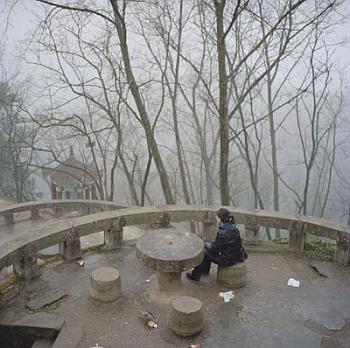
Liu Ke
_______________________
The page, the page, that eternal blankness, the blankness of eternity which you cover slowly, affirming time's scrawl as a right and your daring as necessity; the page, which you cover woodenly, ruining it, but asserting your freedom and power to act, acknowledging that you ruin everything you touch but touching it nevertheless, because acting is better than being here in mere opacity; the page, which you cover slowly with the crabbed thread of your gut; the page in the purity of its possibilities; the page of your death, against which you pit such flawed excellences as you can muster with all your life's strength: that page will teach you to write.
-
Annie Dillard, The Writing Life

Luigi Ghirri
1943 - 1992
1 2 3 It’s Beautiful Here, Isn’t It
Photographs by Luigi Ghirri
Aperture Foundation
_______________________
Photographs Objects Histories: On the Materiality of Images
Elizabeth Edwards (ed) and Janice Hart (ed)
pdf at aaaarg - free reg. req.
The central rationale of Photographs Objects Histories is that a photograph is a threedimensional thing, not only a two-dimensional image. As such, photographs exist materially in the world, as chemical deposits on paper, as images mounted on a multitude of different sized, shaped, coloured and decorated cards, as subject to additions to their surface or as drawing their meanings from presentational forms such as frames and albums. Photographs are both images and physical objects that exist in time and space and thus in social and cultural experience. They have ‘volume, opacity, tactility and a physical presence in the world’ (Batchen 1997:2) and are thus enmeshed with subjective, embodied and sensuous interactions. These characteristics cannot be reduced to an abstract status as a commodity, nor to a set of meanings or ideologies that take the image as their pretext. Instead, they occupy spaces, move into different spaces, following lines of passage and usage that project them through the world (Straw 1998:2). As all the chapters here demonstrate in their different ways, thinking materially about photography encompasses processes of intention, making, distributing, consuming, using, discarding and recycling (Attfield 2000:3), all of which impact on the way in which photographs as images are understood.
For many decades writing on photography has resonated with references to the photograph as object. These references have made tantalizing and fleeting appearances, never to be pursued fully or systematically (....)
Image content is, of course, fundamental to all the photographs that are discussed in this book. There are several reasons why this is so. Image content is our familiar way of thinking about photographs at the simplest level. Image content is usually why photographs were purchased, collected, exchanged or given as gifts in the first place, for the indexical appeal (that brief moment of exposure of the real world in front of the camera) is one of the photograph’s defining qualities. However, the chapters in this volume also argue that there is a need to break, conceptually, the dominance of image content and look at the physical attributes of the photograph that influence content in the arrangement and projection of visual information. Consequently, while the chapters cannot hope to address all the multitude of material forms and performances with which photographic images are entangled, they none the less seek to redress this balance and, as a heuristic device, privilege the materiality of photographs whether in albums, in the museum gallery or in people’s daily lives. This is intended not to attempt the impossible—to divorce the materiality of the photographic image from the image itself— but rather to consider in what ways the material influences contain or perform the image itself. Just as Barthes argues that the image and referent are laminated together, two leaves that cannot be separated (landscape and the window pane for instance) (Barthes 1984:6), photographs have inextricably linked meanings as images and meanings as objects; an indissoluble, yet ambiguous, melding of image and form, both of which are direct products of intention.
While all the chapters discuss images, the arguments are critically focused on the role of the material in understanding those images. In shifting the methodological focus away from content alone, it can be seen that it is not merely the image qua image that is the site of meaning, but that its material and presentational forms and the uses to which they are put are central to the function of a photograph as a socially salient object. It can also be observed that these material forms exist in dialogue with the image itself to create the associative values placed on them. _______________________
 Atelier Giorgio Morandi
Grizzana, Bologna
1989-90
Luigi Ghirri
_______________________
From Structure to Rhizome
Transdisciplinarity in French thought, 1945 to the present: histories, concepts, constructions
podcast of the conference
Backdoor Broadcasting Company
In the final decades of the twentieth century, the “great books” of postwar French theory transformed study in the humanities in the Anglophone world. These books were all, in one way or another, transdisciplinary in character. Yet their reception has primarily taken place in an array of specific disciplinary contexts, isolated from a broader understanding of the intellectual dynamics, forms, significance and innovative potential of transdisciplinarity itself. This conference aims to redress this situation. Each speaker will reflect on the transdisciplinary functioning of a single concept in French thought since 1945, with respect to a founding text, a particular thinker or a school of thought.
Speakers:Éric Alliez, Étienne Balibar, Andrew Barry, Guillaume Collett, François Cusset, Jean-Marc Lévy-Leblond, Alain de Libera, Peter Osborne, Michèle Riot-Sarcey and Stella Sandford.
via Continental Philosophy
_______________________
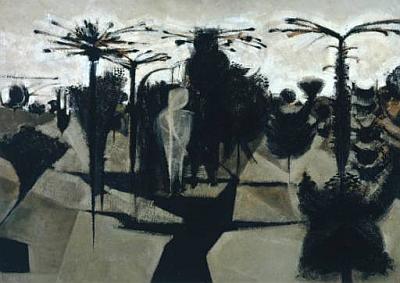
Keeper of the Dark Copse II
1951-2
Alan Reynolds
b. April 27, 1926
_______________________
350 Degrees of Inseparability
The Good News About the Very Bad News (about Climate Change)
Rebecca Solnit
These days, I see how optimistic and positive disaster and apocalypse movies were. Remember how, when those giant asteroids or alien space ships headed directly for Earth, everyone rallied and acted as one while our leaders led? We're in a movie like that now, except that there's not a lot of rallying or much leading above the grassroots level.
The movie is called "Climate Change," and you can tell its plot in a number of ways. In one, the alien monsters taking over the planet are called corporations, while the leaders who should be protecting us from their depredations are already subjugated and doing their bidding. Think of Chevron, Exxon, Shell, and the coal companies as gigantic entities that don't need clean water, or food, and don't care much if you do (as you can see from the filthy wreckage in their extraction zones and their spin against the science of our survival).
My recent research into conventional disasters suggests that climate change, despite its unconventional scale, is unfolding in ways familiar from the aftermaths of numerous hurricanes and earthquakes: the ruling elites too often "lead" by creating a second wave of destruction, while the rest of us pick up the pieces and do our best to do what's necessary. This is a movie whose crisis is upon us and whose resolution is out of sight, but if we are to be saved, I'll put my money on the small characters mitigating the crisis and getting us through the rough times to come....(more)
_______________________
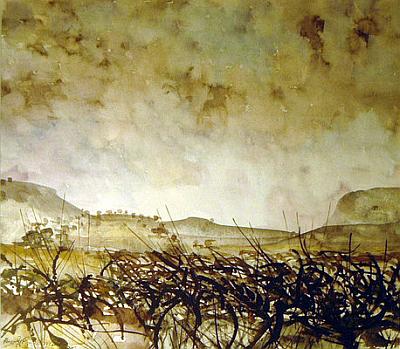
Landscape with Thorn Hedge
Alan Reynolds
1955
_______________________
Spring is like a perhaps hand
(which comes carefully
out of Nowhere)arranging
a window,into which people look(while
people stare
arranging and changing placing
carefully there a strange
thing and a known thing here)and
changing everything carefully
spring is like a perhaps
Hand in a window
(carefully to
and fro moving New and
Old things,while
people stare carefully
moving a perhaps
fraction of flower here placing
an inch of air there)and
without breaking anything.
- e.e. cummings
_______________________

Dunya Fantasyland, Indonesia
DreamCity
Anoek Steketee via Mrs. Deane
_______________________
Influency Salon
engaging conversations with contemporary Canadian poetry
Issue 1: Reading from the Inside
via Laurier Press Blog
_______________________
And one star, swinging, take its place, alone,
Cupped in the larches of the mountain pass ---
Until, immortally, it bled into the dawn.
I left my sleek boat nibbling margin grass. . .
-
Hart Crane (July 21, 1899 - Apr. 27, 1932), The Bridge
.....................................................
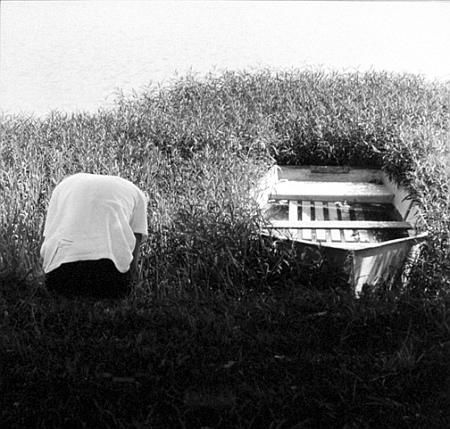
Ralph Eugene Meatyard
1961
1 2 3

Dulwich Wood
April 2010
Jean Morris
tasting rhubarb
_______________________
extracts from “Two to the Power of Six”
a work-in-progress based on Yi Jing
Richard Berengarten
We wash things
We wash things,
pour oil on them,
use them
for carrying, cooking,
cutting. Meanings
slip from one
thing to another.
Things also wing through
time, acquiring and
discarding meanings
like feathers. It’s the small
particles model and
mould dooms. The spaces
between shall also be opened,
and ways names
blur one another be noted.
But who shall open them,
rename them, and return?
Feature: Richard Berengarten
curated by Catherine E. Byfield
in the emerging Jacket 40
Richard Berengarten at Salt Publishing_______________________

Charles Jencks' 'Garden of Cosmic Speculation',
Portrack House, near Dumfries
The Garden of Cosmic Speculation
via Sheila Lennon
"Open to the public only one day a year, the Garden of Cosmic Speculation takes science and maths as its inspiration. Quite simply, there isn’t another garden like it in the world."
_______________________
Zelda Revisited
Brian Oliu
conjunctions
Unlike before we start not in the middle of a decision, not in the middle of the egg, but in a house that someone has built. Unlike before where we were swordless, where we were a child, we have knives, a shield, a weapon to dash out in front of our body like a jabbing tongue, a retracting thorn. We are older now, we are told, we have been tested, we have burned through trees, we have separated rock from rock, evaporated water with a song—here, a pond with no heart—we can only play one song—we can play that song again if we are allowed.
The beauty is that we have lost everything except our sword, except our shield, and there is nothing to remember or to be remembered....(more)
_______________________
[etude homage, Religio Medici]
How we outlive our notions of ourselves
and never know the others in there all along
give them away, become them
only at a stretch imagine
and the stretch is good
the old deep topaz Madeira glow
the pole of the day slowly turns on in its stared down into depths
taste the nigh noon pass!
the tongue decides
better than hands the layers of the day
for the other, I use it but like my Globe
and turne it round sometimes for my recreation
. . . yet to begin the Alphabet of man
by Kenneth Irby
from The Intent On: Collected Poems, 1962-2006
A Kansas Condition of Text
Kenneth Irby’s poetry Ben Friedlander American Poetry in the Age of Whitman and Dickinson
Kenneth Irby’s The Intent On
John Latta Coldish sun-slanting late March six o’clock amongst a folderol of bookish tumulus, burial “mounds.” That is, the books stack up against perennial shelflessness, lost in knee-high tightly snug’d piles. Filling a narrow corridor between the shelf itself and the table. De temps en temps I shift and uncover: redistributing, trying to determine and guide my own upcoming enthusiasms and intents. Or my dour indifferences. I keep dipping into the monstrous (glorious) anchor (or sky hook) of one pile—Kenneth Irby’s The Intent On: Collected Poems 1962-2006, edit’d by Kyle Waugh and Cyrus Console (North Atlantic Books, 2009). My remarks here inchoate, wing’d, desultory, though hardly tepid. Like all Kansas, it is something unruffled and wholly inhabitable: not a page without its magnificent thing...(more)
‘Kenneth Irby: poet & professor’ Josh Hafner presented by Pierre Joris
Kenneth Irby at PennSound and EPC
The Intent On: Collected Poems 1962-2006
Kenneth Irby
google books _______________________
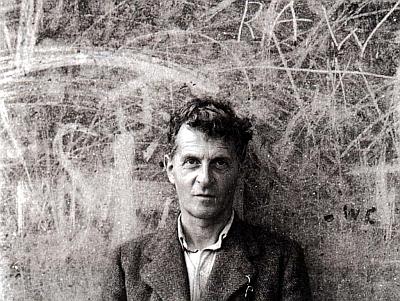
Ludwig Wittgenstein
b.April 27, 1889
Photographed by Ben Richards in Swansea
_______________________
Wittgenstein's Dream
Peter Porter
I had taken my boat out on the fiord,
I get so dreadfully morose at five,
I went in and put Nature on my hatstand
And considering the Sinking of the Eveninglands
And laughed at what translation may contrive
And worked at mathematics and was bored.
(....)
After dinner I read myself to sleep,
After which I dreamt the Eastern Front
After an exchange of howitzers,
The Angel of Death was taking what was hers,
The finger missed me but the guns still grunt
The syntax of the real, the rules they keep.
And then I woke in my own corner bed
And turned away and cried into the wall
And cursed the world which Mozart had to leave.
I heard a voice which told me not to grieve,
I heard myself. 'Tell them', I said to all,
'I've had a wonderful life. I'm dead.'
...(more)
_______________________
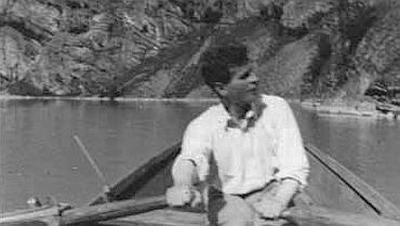
Wittgenstein
rowing from Skjolden to his house
Ludwig Wittgenstein: A Biographical Sketch

Questioning Children
1949
Karel Appel
b. April 25, 1921
_______________________
Sleeping with the Alphabet
Peter Porter
You glorious twenty-six, not equal
In purport, short straws of words,
Come with me in the night-time squall,
My hurricane of verbs.
My chiefest pegs to hang fear on —
Don’t think it’s only sights
Which dreams call up — Wordsong
Lingers in the tucks and sweats.
Sounds of pre-performance, cries
Subsumed in nothingness,
Hoping to syllabicize
Themselves as messages?
The A of Anger, E of Death,
An I who might not be myself
And O the deadly wind that bloweth
Unto U, my vowel of Truth
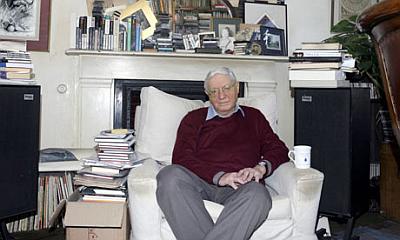
Peter Porter
1929 – 2010
Photograph: Eamonn McCabe/Guardian
Two poems
Jacket 16
Interview
Three Pontormos For Peter Porter
George Szirtes Celebrating the Collected Poems of Peter Porter
John Kinsella
Better Than God, by Peter Porter
Reviewed by Michael Glover
Discs with Everything
Moses had a trusted follower
at a level lower than his own
who helped to carry down the Decalogue
from Sinai. What’s not well-known
is that the Tablets this time came
with special offers, if he filled the form in,
of incisive and assured declensions
of parallel religions from established
and adjacent states, Assyria, Egypt
and a place called Pontus. He shook them out
over his waste-papyrus basket –
they made quite a clatter. Nothing, he said,
can match the matchless offers of the Lord.
Later there were so many unsolicited
additionals to be discounted.
Along with his Vita Nuova, Dante
was obliged to include a CD
of extracts from the Summa Theologica
and an offer of a year’s subscription
to the whole concordance. Paradise Lost
was similarly intruded on
by Affairs of State in tiny type
endorsed by Andrew Marvell
on reproduction House-of-Commons-
headed paper. Many decades on, Mein Kampf
was outweighed by its onanist inclusions.
Today we know that when tomorrow dawns
all separate offers will be off –
a crowded planet’s just an insight
into Heaven or its still invisible
other side, as Hell, and souls will be
unseparate as Blake’s hunched grains of sand.
But this we cannot feel because we clutch
our own Complete and Finished Works
and have been promised readership
and plaudits. Is it my impulsive notes,
my sugared sonnets or my wizened words
you’ll love? I have a dusty disc which played
will cry and cry and will not be switched off.
Peter Porter at Poetry International Web
_______________________
Nature’s own
Extracts from Viimeiset vieraat. Elämää autiotaloissa
[The last visitors. Life in abandoned houses, 2010]
by Kai Fagerström, Risto Rasa & Heikki Willamo.
Text by Willamo, poems by Rasa,
photographs by Fagerström and Willamo
Translated by Jill G. Timbers
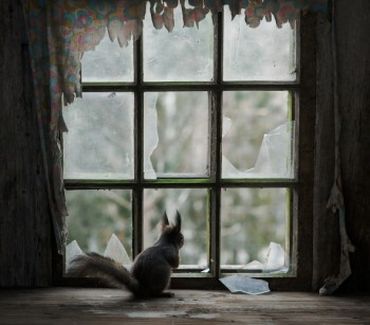 Some thirty years later I found the badgers’ cottage again – it wasn’t the same one, but the mood of my childhood still floated there. Grey walls and a shingle roof, bare gaping windows, the door creaking on its single hinge. Oak tree in the yard, lilacs flourishing wild. The forest was rapidly reclaiming its own behind the cottage. The mounds of sand beside the wall bases showed prints of strong-clawed paws and a number of paths, hardened from use, led into the woods.
Some thirty years later I found the badgers’ cottage again – it wasn’t the same one, but the mood of my childhood still floated there. Grey walls and a shingle roof, bare gaping windows, the door creaking on its single hinge. Oak tree in the yard, lilacs flourishing wild. The forest was rapidly reclaiming its own behind the cottage. The mounds of sand beside the wall bases showed prints of strong-clawed paws and a number of paths, hardened from use, led into the woods.
I wandered about the yard, looked at the cottage and peeked in the windows. The grey panelling was pretty and at the same time free of unnecessary ornamentation. In the front hall were shoes now decades out of style, in the main room a partially collapsed fireplace, a rusty stove and a stool missing a leg. Between the forest and the house were berry bushes and a few apple trees just barely clinging to life. In front, a hillside field facing south.
I sat in the yard under the great birch tree to await evening. I felt again the tingle of excitement of my childhood evenings in the cottage’s enchanted garden, but now the feeling was seasoned with nostalgia. It was a longing for that innocent time and at the same time for a world that was gone. The foundation stones of our lives are set at an early age and we carry those foundations through the years. Home leaves tracks within us just as do things and events experienced strongly. As adults we see the world through tinted glasses and somewhere deep within we long for the world of our childhood....(more)
Books from Finland_______________________
Frogs At Lago Bolsena
Having come down and run the car into sand
Not a foot from the reeds, the tense changes to
The Italian present and stories of Montefiascone
Are right for the first perambulation -
Only a few plastic bags floating and the smell
Of burning in the hills mild as eleven o'clock:
Then the frogs start - out there in the shallows, one
After another clamouring against official Nature.
For Nature is official here, its privilege extended
To recalcitrant weeds and momentous blossoms -
The Miracle of Bolsena struck from an open sky
And like a sunset the Host ran blood: what then
Can prevail upon the gentle waters, calm and bloodless,
When Christ's sanguinity fills the slaughterhouses
And the bone-dry churches? A corpse in damask
Holds the unsyntactical silence of despair.
Invisible and croaking in their plainness, the frogs
Speak of a similarly certain pain never
Lessening, and of the will to bring new pain
After, which this Italy has squared into art,
And which pilgrims with books in their hands try
To exorcize by long looks at lakes, judging
The far bank and marvellous islands until
The picture is captured and killed for their dreams.
Poetry Of Peter Porter
Selected by Coral Hull
_______________________

Eine Kleine Nachtmusik
Dorothea Tanning
1943
1 2
Oldest living surrealist tells all
John Glassie
.....................................................
Eine Kleine Nachtmusik
Peter Porter
When you have lost whatever there is to lose
You will come to the House of Tatterdemalion Proofs
Where reality is always adjacent itself
And words are at war with their subjunctives –
Alas, you recognize the mildewed Classics,
Blake’s Sunflower stranded, Cherubino’s hair on fire,
A pair of gloves for clapping the great aria.
...(more)
_______________________

The Discovery
Karel Appel
1986
_______________________
Unbelief has just enough cunning
To be grateful when nailing the lie
Of transcendence that still every steeple
Points nowhere but into the sky.
- Peter Porter, "A Short Ballad of Unbelief"
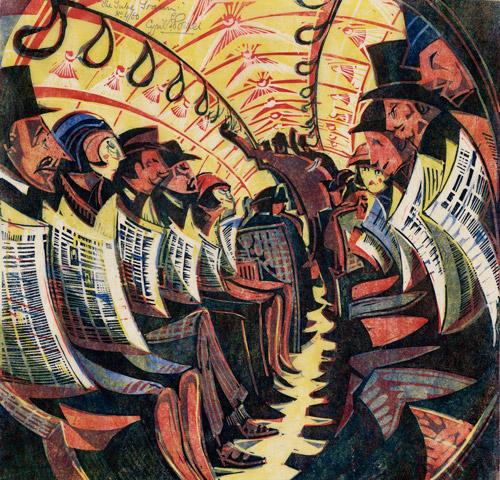 Linocut
ca. 1934
Cyril Edward Power
1872-1951
1 2
... Cyril Power, an extraordinarily creative printmaker, born in 1872, who soaked up Flight's enthusiasms and gave them new force. Power drew on many influences--the German Expressionists (who invented linocutting before the first world war), the Italian Futurists, the Vorticist prints and paintings of Wyndham Lewis--and the enthusiasm for speed and movement that marked the work of so many artists of the period, from Natalya Goncharova to Marcel Duchamp.
- Cyril Power And The Joy Of Cutting
_______________________
The Subway
Edwin Denby
The subway flatters like the dope habit,
For a nickel extending peculiar space.
You dive from the street, holing like a rabbit,
Roar up a sewer with a millionaire's face.
Squatting in the full glare of the locked express
Imprisoned, rocked, like a man by a friend's death,
O how the immense investment soothes distress,
Credit laps you like a huge religious myth.
...(more)
courtesy of Tom Clark
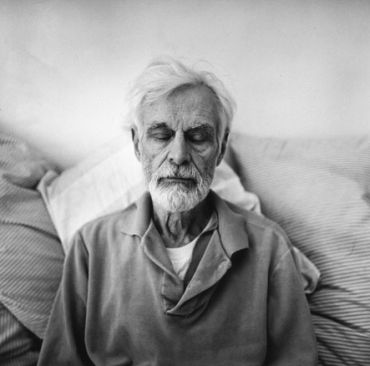
Edwin Denby
1903 - 1983
photo by Peter Hujar Feature: Edwin Denby, 1903–1983
Edited by Karlien van den Beukel
jacket 21 Edwin Denby at PennSound
Edwin Denby: A Great Lyrical Dance Critic
Ntongela Masilela
_______________________
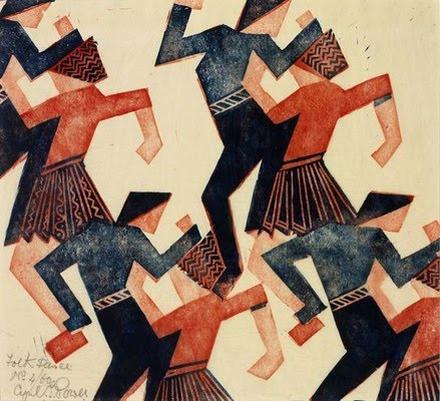
Folk Dance
Linocut
Cyril Edward Power
1928
_______________________
Disorder, mental, strikes me; I
Slip from my pocket Dante to
Chance hit a word, a friend’s reply
In this bar; bare, dark avenue
The lunge of headlights, then bare dark
Cross on red, two blocks home, old Sixth
The alive, the dead, answer, ask
Miracle consciousness I’m with
At home cat chirps, Norwegian sweater
Slumped in the bar, I mind Dante
As dawn enters the sunk city
Answer a one can understand
Actual events are obscure
Though the observers appear clear
-
(Edwin Denby, from “Later Sonnets” in The Complete Poems.)
courtesy of Dan Visel
_______________________
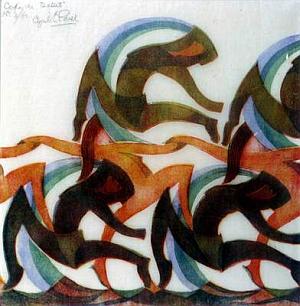
Corps de Ballet
Linocut
Cyril Edward Power
1932
_______________________
I am just old enough to remember those chilling and ominous days of Germany's descent from decency to Nazi barbarism, to borrow the words of the distinguished scholar of German history Fritz Stern. He tells us that he has the future of the United States in mind when he reviews "a historic process in which resentment against a disenchanted secular world found deliverance in the ecstatic escape of unreason."
The world is too complex for history to repeat, but there are nevertheless lessons to keep in mind. There is no shortage of tasks for those who choose the vocation of critical intellectuals, whatever their station in life. They can seek to sweep away the mists of carefully contrived illusion and reveal the stark reality. They can become directly engaged in popular struggles, helping to organize the countless Joe Stacks who are destroying themselves and maybe the world and to join them in leading the way the way to a better future.
- Noam Chomsky, Remembering Fascism: Learning From the Past
_______________________
American Kleptocracy
How Fears of Socialism and Fascism Hide Naked Theft
William J. Astore
_______________________
Anderson Cooper and Class Solidarity
You cannot man the barricades with a mouth full of Cheetos
Joe Bageant
Class solidarity was such a good idea. It really was. Obviously, most of the people who need solidarity are in the world's laboring classes. After all, the rich have more than enough solidarity already, as was recently demonstrated by their successful execution of the greatest global financial heist in history. Oh sure, we'll see some state sponsored mock show trials of a few of them -- they always throw a few of their own out of the sleigh to the wolves during their escapes. The big heist was big news. Working Americans will be applying Preparation H to their keisters for a long time to come.
But the ultimate accomplishment of the already rich, the newly rich and the corporate rich, has been their global solidarity on the corporate/financial front. It's been a long run up to globalism, but the rich have great patience. As an American, all my life I've heard their chief mouthpiece, the president of the United States, beginning with Eisenhower, right on up through Kennedy, Reagan, Ford, Carter and Bush, and now Obama, sing the same song. Which goes moreover like this:
"Trade is the road to peace. Commerce and business know no national boundaries. They link nations together on productivity, creating jobs and peace across the world."
It sounded good at the time. Who would have thought that the people enjoying all this harmony and peace brought about through globalization would be enjoying it in a one big happy planetary work gulag? And if they are not doing so at the moment, they will be as soon global capitalism, under the watchful solidarity of the rich, bears full fruit....(more)
_______________________

Pasting up Posters
1933
Lill Tschudi
1911-2001 Rhythms of Modern Life: British Prints 1914–1939
British Linocuts by Sybil Andrews, Cyril Power & Lill Tschudi
flickr
Grosvenor School Linocuts

Night Mayor
Guy Maddin
2009
13 min 53 s
via gmtPlus9 (-15) the story of inventor Nihad Ademi, who harnesses the power of the Aurora Borealis in 1939 Winnipeg. Ademi uses the power to broadcast images of Canada to its own citizens from coast to coast, but in the process angers the government.
"...a mad inventor tries to harness the heavenly ethers of the aurora borealis and distill them into music and motion pictures. Naturally, this results in a film of psychotropic, collagelike beauty, one that vividly illustrates its own concept of 'ordinary things combined and made miraculous.'”
- The Criterion Collection
_______________________
Illuminated Darkness:
Nightmares, Blind Spots and Biofeedback
Ted Hiebert
ctheory
It is important to note this dark side, this relationship of the nightmare to both the literal darkness of dreams and the figurative darkness of cognitive anxiety, if for no other reason than to immediately insist that an imagination of this sort can have real effects, and not always of the happy creative type. There is an important connection to be made here between the nightmare as a cognitive and physiological manifestation and the type of metaphysical thinking described by Antonin Artaud as "active metaphysics," thinking that insults itself, that situates itself "in between gesture and thought," "between dreams and events," as a literal form of incantation. The notion of thought as incantation is nothing if not a most literal description of nightmares, imagined encounters that nevertheless do not obey the boundaries between dreams and reality. This is to say not only that nightmares may have metaphysical importance, but also that they might provide an access point to the imagination through the power of metaphysical manifestation. In this spirit of Artaud's "active metaphysics," one might call nightmares a form of thinking in reverse, a metaphysical reverse-engineering whose end-game is a flip of Nietzsche's declaration that we only remember what hurts, transformed into a mnemonic device, a nihilist pedagogy of one sort or another. ...(more)
one of three new essays in Code Drift: Essays in Critical Digital Studies
_______________________
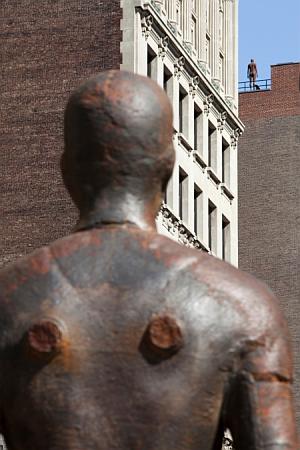
Event Horizon, 2010
Madison Square Park
Photograph by James Ewing
via riley dog
_______________________
Parka
Paul Ford
Ftrain
(....)
The 80s was the last truly futuristic decade. Skinny ties. Power, Corruption & Lies. Tass Times in Tonetown. Something about constant nuclear threat and Neuromancer. After that we kind of caught up with the future. Before, well, the future in the 70s was much goofier. Filtered cigarettes. R2D2. Kitchen appliances. People kept coming up with new kinds of magnetic tape, and new ways to change vinyl records.
I wonder if when we look back at this month of iPad if we'll think what an amazing moment to have lived through, or if it will be like some guy with sideburns telling your dad about the reel-to-reel player in his carpeted van. ...(more)
_______________________

McCann-Erickson Agency
Madison Avenue, New York
Henri Cartier-Bresson
1959
Henri Cartier-Bresson: The Modern Century
April 11–June 28, 2010
_______________________
Can we already grasp the rough outlines of these coming forms, capable of threatening the joys of marketing? Many young people strangely boast of being "motivated"; they re-request apprenticeships and permanent training. It's up to them to discover what they're being made to serve, just as their elders discovered, not without difficulty, the telos of the disciplines. The coils of a serpent are even more complex than the burrows of a molehill.
Postscript on the Societies of Control
Gilles Deleuze
_______________________
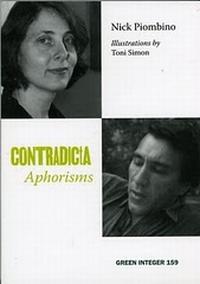
Contradicta Aphorisms
Nick Piombino and Toni Simon
Review by Ron Silliman
Looking at the 400 (exactly) aphorisms collected in Nick Piombino’s Contradicta: Aphorims, a collaboration with painter & collagiste Toni Simon, you might think that since aphorisms are by their nature quite short – I think the longest one here runs to all of four sentences – that this will be the literary equivalent of Skittles, something sweet that you can gobble by the handful & run through pretty quickly.
You would be exactly wrong.
If, in fact, there is an appropriate analog for this little book (6” high, 4¼” wide, 167 pages thick, with no more than 4 aphorisms per page & that much only 33 times), it’s not Skittles but ironwood, the carved objects of which invariably weigh several times what you anticipate. This may look like a terrific book to slot into one’s back pocket, to read on the bus or subway, snacking on it as you go about your day. But the truth is it’s heavy. It’s actually difficult to go through more than two or three of these paired aphorisms at a time. You find yourself wanting to think or dream about them. Or the argue about others, sometimes within the same pair....(more)
Nick blogs at fait accompli
_______________________

Photo-Essay: Bankers Trust Company
New York. 1960
Henri Cartier-Bresson
_______________________
14 Thoughts About Sonnets
Every sonnet argues with itself.
Every sonnet argues with other sonnets.
Every sonnet exists in tension.
Every good sonnet is like every good horror movie.
All sonnets are exercises in tonal breath control.
All sonnets are premonitions.
All sonnets tell us the time.
All sonnets begin at the moment of choice.
No sonnet is completely arbitrary.
No sonnet curtails liberty.
No sonnet is merely “formal.”
No sonnet is without formality.
Sonnets convert status into something physical.
Sonnets are honest laws legislated by the sonneteer.
Sonneteering [pdf] Specimens from an evening of sonnets, 2 September 2009 Curated by Eric Elshtain Beard of Bees
A Sonnet for Edgar Allan Poe
Daniel Godston
“When the eyes of Prince Prospero fell upon this spectral image. . . ”
—from The Mask of the Red Death
Despair is scattered bleeding on the moon.
Contagion novel figure will create.
The massy hammers hung on halls with hate,
And chandeliers will eat a gaunt buffoon.
Opprobrium tints fire-light maroon,
Grotesque green smoke caresses arms of fate
In castles glaring turns to devastate.
A thousand precincts carpet lapses soon,
Phantasms emanated ghastly vows
Whose seven chambers dream laughter’s hue,
And murmur westerly the clock bizarre.
The rushing movement jests, not knowing how.
Indulge the bells that reach new presence blue,
Incessant maddened purloined dagger scar.
_______________________
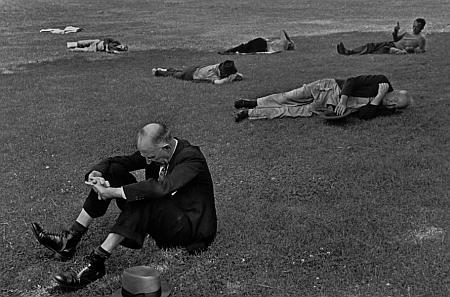
Boston
Henri Cartier-Bresson
1947

schoolroom
Jon Edwards
_______________________
Noam Chomsky Has ‘Never Seen Anything Like This’
Chris Hedges
... as our nation’s most prescient critic of unregulated capitalism, globalization and the poison of empire, he enters his 81st year warning us that we have little time left to save our anemic democracy.
“It is very similar to late Weimar Germany,” Chomsky told me when I called him at his office in Cambridge, Mass. “The parallels are striking. There was also tremendous disillusionment with the parliamentary system. The most striking fact about Weimar was not that the Nazis managed to destroy the Social Democrats and the Communists but that the traditional parties, the Conservative and Liberal parties, were hated and disappeared. It left a vacuum which the Nazis very cleverly and intelligently managed to take over.”
“The United States is extremely lucky that no honest, charismatic figure has arisen,” Chomsky went on. “Every charismatic figure is such an obvious crook that he destroys himself, like McCarthy or Nixon or the evangelist preachers. If somebody comes along who is charismatic and honest this country is in real trouble because of the frustration, disillusionment, the justified anger and the absence of any coherent response. What are people supposed to think if someone says ‘I have got an answer, we have an enemy’? There it was the Jews. Here it will be the illegal immigrants and the blacks. We will be told that white males are a persecuted minority. We will be told we have to defend ourselves and the honor of the nation. Military force will be exalted. People will be beaten up. This could become an overwhelming force. And if it happens it will be more dangerous than Germany. The United States is the world power. Germany was powerful but had more powerful antagonists. I don’t think all this is very far away. If the polls are accurate it is not the Republicans but the right-wing Republicans, the crazed Republicans, who will sweep the next election.”
“I have never seen anything like this in my lifetime,” Chomsky added....(more)
_______________________

Paesaggio caprese
(o vesuviano)
1922 ca.
Enrico Prampolini
b. April 20, 1894
_______________________
The Silence
T. C. Boyle
atlantic
Dragonfly
What a dragonfly was doing out here in the desert, he couldn’t say. It was a creature of water, a sluggish slime-coated nymph that had metamorphosed into an electric needle of light, designed to hover and dart over pond and ditch in order to feed on the insects that rose from the surface in soft moist clouds. But here it was, as red as blood if blood could shine like metal, hovering in front of his face as if it had come to impart some message. And what would that message be? I am the karmic representative of the insect world, here to tell you that all is well amongst us. Hooray! Jabba-jabba-jabba! For a long while, long after the creature had hurtled away in shearing splinters of radiance, he sat there, legs folded under him in the blaze of 118-degree heat, thinking alternately: This is working, and I am losing my mind.
And this was only the first day....(more)
_______________________

Joan Miró
b. April 20, 1893
photo - Man Ray
333 images
_______________________
All We Read Is Freaks
William Bowers
originally in The Oxford American, January/February 2003
Emily Dickinson has had a death grip on my imagination since I first encountered her by way of a lisping, born-again, junior-high English teacher in Easley, South Carolina. Miss Crosswell was a proselytizing stickler, a Quasimodette. She had a zeal for pointless authoritative rubric, stuck sermons into her literature lessons, and was empathetically trollish. A proud graduate of Oral Roberts University, Miss Crosswell heard in Dickinson’s poetry what Miss Crosswell purported to hear in everything: the music of unshakeable faith.
My own household was under the spell of Oral Roberts and his ilk. In the anxious womb of my bun-haired, makeup-free mother, I attended revivals of every televangelist who came near town, from Ernest Angley to Jimmy Swaggart. As I was growing up I noted a pendulous quality in my zealous father: every fit of fanaticism complemented one of deviance. This dynamic prompted my early suspicions that religious faith was infinitely more complicated than the airtight version the adults around me were so desperately marketing. To her credit, Miss Crosswell felt a need to allude to a ribald past she was not proud of, but these obstacles didn’t stop her from seeing Dickinson as her kindred. They both lived alone, in houses with enviable views, saving themselves for some Great Approaching Thing. My inner reactionary accused Miss Crosswell of selective perception, of preferential listening; she seemed to overlook Dickinson’s doubt and wildness and was using her, like Noah used pitch on the ark, to make things stick together, to fill holes....(more)
_______________________
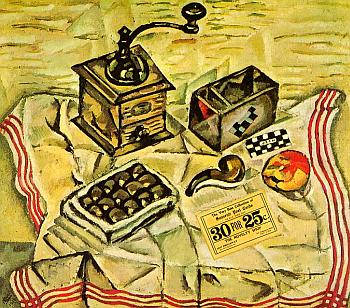
Still-Life with Coffee Mill
Joan Miró
1918
_______________________
Poetry As Experience
Phillippe Lacoue-Labarthe
Translated by Andrea Tarnowski
google books
pdf at aaaarg
_______________________
Collective Imaginings: Spinoza, Past and Present
Moira Gatens and Genevieve Lloyd
pdf at aaaarg - free reg. req.
Introduction
Why read Spinoza now? Of what value today are the beliefs of a seventeenthcentury philosopher who presented his ethical views in geometrical form, and combined his reflections on political practices and institutions with consideration of omens, prophecies and miracles? Underlying this book is the conviction that despite – indeed, because of – its apparent strangeness, the philosophy of Spinoza can be a rich resource for cultural selfunderstanding in the present. His philosophy is in some respects continuous with dominant assumptions of contemporary Western thought, in others strikingly and illuminatingly discontinuous with them. His philosophy is, in many ways, at odds with what became the philosophical mainstream which has helped form our own thought patterns. This dissonance can serve as the point of departure for articulating alternative ways of conceiving of minds and bodies, of individuals and collectives, and of human power, freedom and responsibility. _______________________
Digital reading spaces:
how expert readers handle book, the web, & electronic paper
Terje Hillesund
first monday
_______________________
English: The International Language of Police Power
Robert Hariman

The use of the English “police” is clearly political on several levels. I’ve learned that it is not easy to quickly find the extent of US funding of the Thai police force or of any other police force. I did learn, however, that despite “legislation prohibiting US agencies from using foreign economic or military assistance funds to aid foreign police,” Congress also granted so many exemptions that the “GAO did identify 125 countries that received U.S. training and assistance for their police forces during fiscal year 1990.” That was then, but I doubt much has changed (and note that the GAO was having trouble identifying countries, in part because money for police forces flows through many difference agencies). It certainly hasn’t changed in Thailand, where the US Embassy reports a staff of ten to support police work and even includes a slide show of police training.
I suspect that one reason the police of the world prefer to label themselves in English is that so many of them are being funded, trained, and equipped by the US, with the UK and Australia playing supporting roles. The English speaking peoples of the world can bask in the knowledge that their common tongue has become the international language not merely of science and commerce but also of police power. No matter whether those police are corrupt or not (want to place a bet, say, about the Royal Thai Police?). No matter whether they enforce rule of law or take the law into their own hands. No matter whether they maintain civic order or brutalize regime opponents, English gets the credit....(more)
the redesigned BagNews!
_______________________
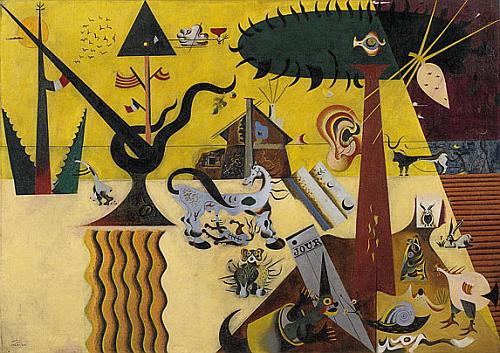
Joan Miro
1923.
_______________________
The Infinite Conversation
Maurice Blanchot
Translation and Foreword by Susan Hanson
pdf at aaaarg - free reg. req.
Opinion, the opinion without material basis that one reads in the newspapers— but never in any particular one—is already closer to the panic character of the question. Opinion settles and decides by way of a speech that does not decide and that does not speak. It is tyrannical because no one imposes it, no one is accountable for it. The fact that there is no answering for it (not because no guarantor is to be found, but because it asks only to be spread, not affirmed or even expressed) is what constitutes it as a question never brought to light. The power of rumor is not in the force of what it says, but in the fact that it belongs to the space where everything that is said has always already been said, continues to be said, and will not cease being said. What I learn through rumor I have necessarily already heard, it being what is simply related and what, for this reason, requires no author, no guarantee or verification. Rumor is what abides no contestation since its sole, its incontestable truth is to be related in a neutral movement wherein the relating seems reduced to its pure essence—a pure relation of no one and nothing.
Assuredly, opinion is nothing but a semblance, a caricature of essential relation, if only because it is a system organized on the basis of utilizable means, instruments of the press and pressure, the broadcast media and centers of propaganda that transform into an active power the passivity that is its essence, into a power of affirmation its neutrality, into a power of decision the sense of impotence and indecision that is opinion's relation to itself. Opinion does not judge or opine. Radically unavailable because foreign to any position, it is all the more at one's disposal. This justifies every criticism. Nevertheless, its panic movement escapes those critics who stress precisely opinion's seductive and tranquilizing alienation, for its movement constantly dissipates this power by which everything is alienated into a nullity or an inalienable indetermination. He who believes that he has rumor at his disposal rapidly loses himself in it. Something impersonal is always in the process of destroying in opinion all opinion. This is the vertigo of uprooting. The insipid ideas and linguistic banalities that serve as its vehicles dissimulate the way it sinks into profundity, the diversion that plunges into the vortex of flight.
(....)
Can we at least delimit the experience of this neutral turn that is at work in turning away? One of the characteristic traits of this experience is that it cannot be assumed by the one to whom it happens, by a subject in the first person; it only realizes itself by introducing into the field of its realization the impossibility of its accomplishment. This is an experience that, even while escaping all dialectical possibility, refuses to fall into some realm of evidency or into an immediate grasp, just as it has nothing to do with a mystical participation. An experience, therefore, in which the disputes of the mediate and the immediate, subject and object, intuitive knowledge and discursive knowledge, the cognitive relation and the love relation, are not transcended but left aside. The most profound question is this experience of being diverted in the mode of a questioning that is foreign, anterior, or posterior to any question. Man is turned by the profound question toward what turns aside-and turns itself aside.
from Section 1, Plural Speech _______________________
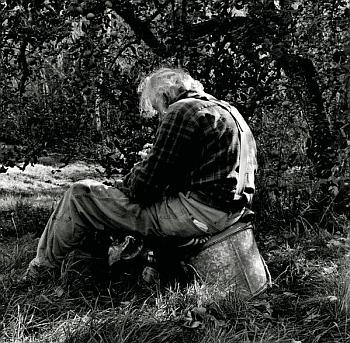
orchard lunch
Jon Edwards
 Hypatica and Acorn
photo - mw
_______________________
Passage
Rae Armantrout
1
I held the framework
of my life in mind
with some precision.
I knew when I was
where — or where I was
when — but not many
incidents of my past had
actually been preserved.
Instead the frame served
as a cargo cult runway,
forever inviting
the future to appear.
I existed finally
as the idea
of temporal extension.
2
The creeper
lineates
the wall.
Flowers as punctuation?
Can you elaborate
on the passage?
Double meaning,
superposition:
hair standing on end
makes a creature appear
larger, more ferocious.
Celebrating Rae Armantrout Pulitzerlinks assembled by Ron Silliman
Rae Armantrout at PennSound and EPC
7 Poems, by Rae Armantrout
Beard of Bees Publications
(#15: June, 2004)
_______________________
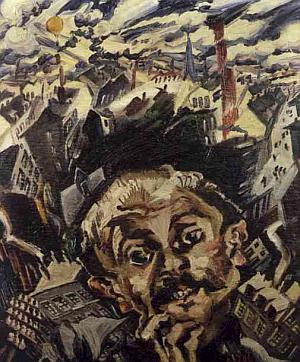
I and the City
Ludwig Meidner
b. April 18, 1884
_______________________
Many philosophies refer to sight; few to hearing; fewer still place their trust in the tactile, or olfactory. Abstraction divides up the sentient body, eliminates taste, smell and touch, retains only sight and hearing, intuition and understanding. To abstract means to tear the body to pieces rather than merely to leave it behind: analysis.
The Five Senses
A Philosophy of Mingled Bodies Michel Serres
Translated by Margaret Sankey and Peter Cowley pdf at aaaarg - free reg. req.
Cultures mature when they transfer their focus on relationships between people to innocent obj ects. A more relaxed collective life tends to improve our morals, such as when men turn their attention away from the anxious, uncomfortable loves of their neighbours, towards the trajectory of a comet. The society in which surveillance dominates ages quickly, becoming old-fashioned and abusively archaic. The past lurks there like a monster, harking back to the age of myth.
Surveillance and observation. The human sciences keep watch, the exact sciences observe. The first are as old as myths; the others are born with us and are as new as history. Myth, theatre, representation and politics do not teach us to observe, they commit us to surveillance.(....)
The human sciences are necessarily involved in the worst kinds of double dealing, whether from beneath the table or behind your back. The term hypocrisy describes this procedure quite well: here method is critical - hypocritical - by undermining or backstabbing obj ects or relationships. It tricks tricksters, deceives deceivers and hides behind those who cheat (those who cheat do it behind the players' backs) , it robs robbers, plays policeman to the gendarmes, teaches the most famous detectives a lesson, subj ects the grand inquisitor to searches, keeps voyeurs under surveillance, betrays liars, studies the weak and miserable, exploits them by taking from them information, their little secrets, their last possessions.
The hypocritical method consists in always placing oneself behind, and this immediately creates a queue. One must therefore get quickly behind the last person in the queue, stand behind the last one whose back can still be seen, then hide one's own back for fear of being caught in turn by someone who has understood the game . Thus the rules of the method: set a liar and a half to catch a liar, a more depraved person to catch a depraved one, the pluperfect, or more-than-perfect, as we used to say; a theoretician to catch a voyeur.
_______________________

Homage to MCE
Forum, Rome
Rolfe Horn
_______________________
The Modern Anti-World
John Zerzan
... how do we get out of here - off this death ship? Nostalgia alone is hardly adequate to the project of emancipation. The biggest obstacle to taking the first step is as obvious as it is profound. If understanding comes first, it should be clear that one cannot accept the totality and also formulate an authentic critique and a qualitatively different vision of that totality. This fundamental inconsistency results in the glaring incoherence of some of the works cited above.
I return to Walter Benjamin's striking allegory of the meaning of modernity:
"His face is turned toward the past. Where we perceive a chain of events, he sees one single catastrophe, which keeps piling ruin upon ruin and hurls it in front of his feet. The angel would like to stay, awaken the dead and make whole what has been smashed. But a storm is blowing from Paradise; it has got caught in his wings with such violence that the angel can no longer close them. The storm irresistibly propels him into the future to which his back is turned, while the pile of debris before him grows skyward. This storm is what we call progress."
There was a time when this storm was not raging, when nature was not an adversary to be conquered and tamed into everything that is barren and ersatz. But we've been traveling at increasing speed, with rising gusts of progress at our backs, to even further disenchantment, whose impoverished totality now severely imperils both life and health. Systematic complexity fragments, colonizes, and debases daily life. Division of labor, its motor, diminishes humanness in its very depths, dis-abling and pacifying us. This de-skilling specialization, which gives us the illusion of competence, is a key, enabling predicate of domestication....(more)image: Paul Klee, Angelus Novus
_______________________
Signs and Symptoms
Robert Gal
translated from the Slovak by Charles Sabatos
exquite corpse
VIII
A spell of dizziness. When our "dizziness becomes law" (Cioran), it is already too late. We no longer harden, petrified and fascinated with light, we no longer tremble at the unnamed horrors of the darkness. At the limits, it is not the best, but it's good. What we lack is gradually more nebulous, but not more uncertain.
The less time we have, the more space we take. It is necessary to aim precisely. Our last abyss wants to be bounded. . . by us!
IX
Panic is the emotional tremor of a short circuit, drawn out despondently into a permanent irritation. Not daring to say YES is symptomatic of fearing an expected NO. The moment before is firmly decided by the dare to jump beyond. Signs speak when expressed. Expression, concentrated in the brightness of eyes, directly depends on the possibility of light falling on a megalomaniac screen surface.
X
The truth does not persuade.
...(more)
_______________________
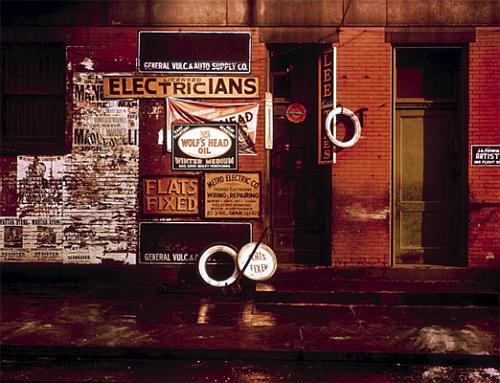 Flats Fixed
New York City, circa 1938
Eliot Elisofon
1911-1973
_______________________
Fieldwork
Rae Armantrout
One's a connoisseur of vacancies,
loud silences
surrounding human artifacts:
stucco hulls
of forgotten origin
that squat
over the sleepers
in rows
on raised platforms.
She calls her finds
"encapsulations."
...(more) Four Poems from Electronic Poetry Review
_______________________
Language Portal of Canada / Le Portail linguistique du Canada
via languagehat

(Library of Congress)
I sit astride life like a bad rider on a horse.
I only owe it to the horse's good nature that I am not thrown off at this very moment.
(1939-1940)
Problems of Life: Wittgenstein
Tom Clark
Exquisite Corpse
_______________________
from Quandaries
Ted Mathys
The Figure Considers Fossils
imprisoned on the fissure the figure considers
the fossils in the rock between the figure and the arrested
red | the arrested red is arrested beneath the depth
by the figure | the fossils between
the figure’s fissure and the arrested red
are not arrested | the fossils are rather a facet of the rock |
the rock is a facet of the slope | the slope is a facet of the jut | the jut
is a facet of the scape | the scape is a facet of creation | the figure figures
creation contains no large-winged ones | the large winged-ones
were either created by the figure’s considerations
or have abandoned the figure altogether | either
way the figure’s existence on the jut is but the sum of the figure’s actions |
the figure refuses despair | instead the figure regards
the trees on the lacquered black space
between the figure and the blue on the scape | the trees sway in
but the fossils retain their shape | the figure considers the fossils
individually | the figure experiences each fossil as the figure
would experience the figure were the figure regarding the figure from the other
side of the moving blue | layer by layer the figure considers
the shape of each fossil | the size of each fossil | the era of each |
the figure considers deeper and deeper through layers of creation
until the figure arrives at the fossil of a gun
_______________________
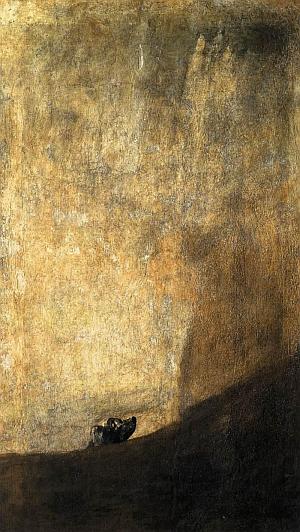
The Dog
1822
Francisco Goya
d. April16 1828 Goya's Caprichos Goya's Disasters of War
_______________________
from Quandaries
Ted Mathys
Conjunctions
The Figure and the Lichen
the figure discovers umber
lichen on the jut | the figure does not
like the lichen but likens the lichen
to a facet hidden within the figure | the facet is in
the shape of the lacquered black space
between the slope of the jut and the trees on the scape |
the trees sway in | the blue moves out |but the facet
will always retain its shape | the figure touches the exterior umber
lichen on the rock and recoils | beneath the depth the red
begins to well | the exterior umber is too like
the lichen hidden within | the figure considers stabbing with a clast
fractured from the shelf the lichen hidden within | the figure recoils | no
figure knows how to kill interior lichen | no figure knows
why figures contain such ungraspable lichen | the figure only knows
that if the only figure knew
how to escape the inimitable fissure
or clast-stab the lichen | the figure might then
finally cry with accuracy
Mathys in MiPOesias Magazine
The Spoils
Poems by Ted Mathys Coffee House Press
Forge
Poems by Ted Mathys
Coffee House Press
_______________________
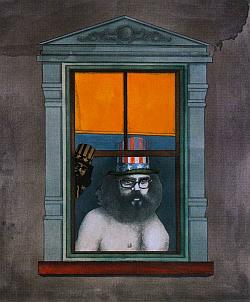
The Poet
1969
Richard Lindner
d. April 16, 1978
_______________________
of vanity, anonymity and cults
from Blanchot, Le Pas au-delà
courtesy of Matt Christie
Let us be clear that we will never have gotten away from the name, even if we are marked by the pre-original anonymous. The anonymous is given to us in the name itself, not freeing us in any way from ourselves, from our identity and from this face that needs, to refuse itself any access, the faceless, the gazeless, mask that transforms everything into a mask and that nothing unmasks. The more strong and justified the name, the more it gives hold to the perversion of the anonymous; the more that greatness, creative force, indubitable truth present themselves in a name, the more it is ready to denounce itself as the error or the injustice which has thrived at the expense of the nameless. But, in return, everything happens as if the anonymous, shadow of which light would be unaware that it shines only to project it, arranged the whole comedy of glories, of powers, of sanctities, in order to bring itself near to us, signalling to us across signification and precisely there where every sign would be lacking.
When we sign, affirming our identity, we become responsible well beyond this signature, to the point that this responsibility has forever put us aside, signing to disappropriate us, like a forgerer who would not try to pass as true, but would make the true shine out as false....(more)
The step not beyondMaurice Blanchot translation of Le Pas au-delà by Lycette Nelson google books
_______________________
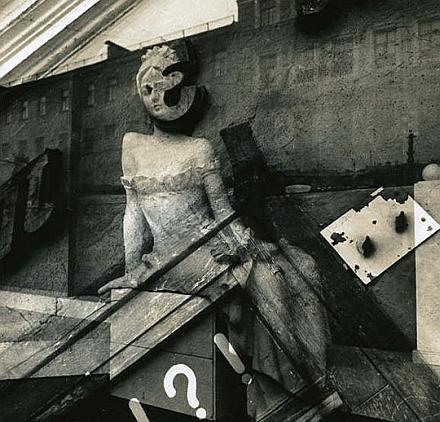
Nomenclatura of signs
Alexey Titarenko
_______________________
Anticapitalist Readings of Weber’s Protestant Ethic:
Ernst Bloch, Walter Benjamin, György Lukacs, Erich Fromm
Michael Löwy
logos
Weber ignores exploitation, is not interested in economic crisis, has little sympathy for the struggles of the proletariat, and does not question colonial expansion. However, influenced by the Romantic or Nietzschean Kulturpessimismus, he perceives a deep contradiction between the requirements of the formal modern rationality — of which bureaucracy and private enterprise are concrete manifestations — and those of the acting subject’s autonomy. Distancing himself from Enlightenment’s rationalist tradition, he is sensitive to the contradictions and limits of modern rationality, as it expresses itself in capitalist economy and state administration: its formal and instrumental character and its tendency to produce effects that lead to the reversal of the emancipatory aspirations of modernity. The search for calculation and efficiency at any price leads to the bureaucratization and reification of human activities. This diagnosis of modernity’s crisis will be, to a large extent, taken over by the Frankfurt School in its first period (Adorno, Horkheimer, Marcuse).(....)
Soon after Weber’s death, there appears in the Weimar Republic an intellectual constellation - essentially composed of Jewish authors of German culture - which one could describe as the anti-capitalist - as well as, to a large extent, anti-protestant, or anti-calvinist - readings of Max Weber. This sort of interpretation must be considered, to a large extent, as a creative "misappropriation" : these dissident “disciples” will use the ambivalent arguments of the Protestant Ethic in order to develop a virulent anti-capitalist critique, of socialist/romantic inspiration. (....)
Obviously, this essay interprets Weber against the grain, gegen den Strich, by denouncing both the protestant ethic and the spirit of capitalism in Romantic terms, and by comparing them to pre-capitalist social and religious forms - such as the Medieval civilization - presented as morally and humanly superior. No doubt that his description of the Middle Age is largely idealized, but the hypothesis that Catholic ethics are hostile to the spirit of capitalism appears already in Weber. It may seem surprising that a non-believing, Freudo-Marxist Jew such as Fromm, refers himself to Medieval Catholicism in order to accuse the (protestant) spirit of capitalism, but one can find similar arguments among other Romantic Jewish thinkers of German culture.
These are four striking examples of this « inventive » readings - all by romantic/socialist Jewish/German thinkers – which use Weber’s sociological research, and in particular The Protestant Ethic and the Spirit of Capitalism, as ammunition in order to mount a thorough attack on the capitalist system, its protestant/Calvinist origin, its values, its practices and its “religion”. Some more research is needed to find out if there are other authors which belong to this surprising “constellation”.
Lukacs’ more sober assessment emphasizes the identity between Calvinist ethics and the bourgeois reified consciousness. ...(more)
Logos Journal
2010: Vol.9, Issue 1
_______________________

Spike Milligan
b. April 16, 1918
Born screaming small into this world-
Living I am.
Occupational therapy twixt birth and death-
What was I before?
What will I be next?
What am I now?
Cruel answer carried in the jesting mind
of a careless God
I will not bend and grovel
When I die. If He says my sins are myriad
I will ask why He made me so imperfect
And he will say 'My chisels were blunt'
I will say 'Then why did you make so
many of me'.
Spike Milligan, from Dreams of a Small Scorpion
_______________________

The Gambler
Richard Lindner
1951
|



 Janus Head
Janus Head

 The Age of Briggs & Stratton
The Age of Briggs & Stratton












































 Some thirty years later I found the badgers’ cottage again – it wasn’t the same one, but the mood of my childhood still floated there. Grey walls and a shingle roof, bare gaping windows, the door creaking on its single hinge. Oak tree in the yard, lilacs flourishing wild. The forest was rapidly reclaiming its own behind the cottage. The mounds of sand beside the wall bases showed prints of strong-clawed paws and a number of paths, hardened from use, led into the woods.
Some thirty years later I found the badgers’ cottage again – it wasn’t the same one, but the mood of my childhood still floated there. Grey walls and a shingle roof, bare gaping windows, the door creaking on its single hinge. Oak tree in the yard, lilacs flourishing wild. The forest was rapidly reclaiming its own behind the cottage. The mounds of sand beside the wall bases showed prints of strong-clawed paws and a number of paths, hardened from use, led into the woods.
